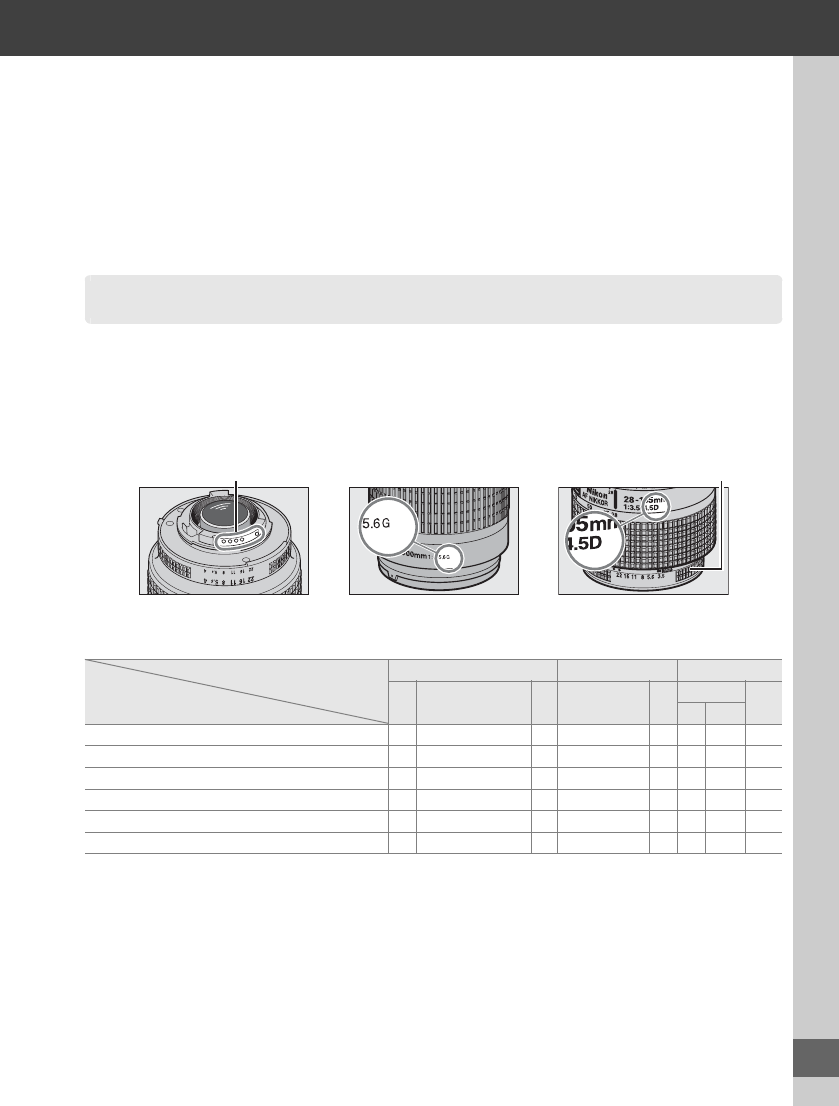
269
n
n
Technical Notes
Read this chapter for information on compatible accessories, cleaning and storing
the camera, and what to do if an error message is displayed or you encounter
problems using the camera.
CPU lenses (particularly types G and D) are recommended, but note that IX-NIKKOR
lenses can not be used.
CPU lenses can be identified by the presence of CPU
contacts, type G and D lenses by a letter on the lens barrel.
Type G lenses are not
equipped with a lens aperture ring.
The maximum aperture of the lens is given by
the f-number in the lens name.
❚❚Compatible CPU Lenses
1 Vibration Reduction (VR) supported with VR
lenses.
2 Spot metering meters selected focus point
(0 105).
3 Can not be used with shifting or tilting.
4 The camera’s exposure metering and flash
control systems may not function as expected
when the lens is shifted and/or tilted or aperture
is set to a value other than maximum.
5AF-S or AF-I lens required.
6 With maximum effective aperture of f/5.6 or
faster.
7 When AF 80–200mm f/2.8, AF 35–70mm f/2.8,
AF 28–85mm f/3.5–4.5 (New), or AF 28–85mm
f/3.5–4.5 lenses are zoomed all the way in at the
minimum focus distance, the in-focus indicator
may be displayed when the image on the matte
screen in the viewfinder is not in focus.
Focus
manually until image in viewfinder is in focus.
8 With maximum aperture of f/5.6 or faster.
Compatible Lenses
CPU contacts Aperture ring
CPU lens Type G lens Type D lens
Camera setting Focus Mode Metering
Lens/accessory
1
AF
M (with electronic
rangefinder)
M
Auto and scene
modes; P, S, A
M
a
Z
b
3D Color
Type G or D AF NIKKOR/AF-S, AF-I NIKKOR ✔✔✔✔✔✔— ✔
2
PC-E NIKKOR series — ✔
3
✔✔
3
✔
3
✔
3
— ✔
2
,
3
PC Micro 85mm f/2.8D
4
— ✔
3
✔ — ✔✔ — ✔
2
,
3
AF-S/AF-I teleconverter
5
✔
6
✔
6
✔✔✔✔— ✔
2
Other AF NIKKOR (except lenses for F3AF) ✔
7
✔
7
✔✔✔— ✔✔
2
AI-P NIKKOR — ✔
8
✔✔✔— ✔✔
2


















